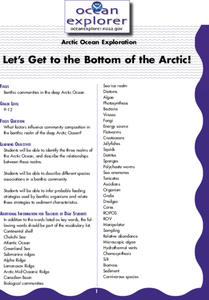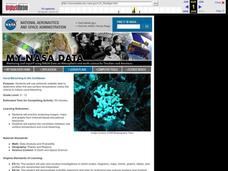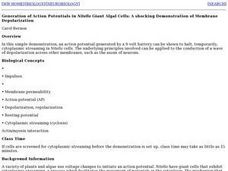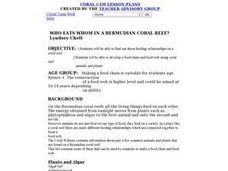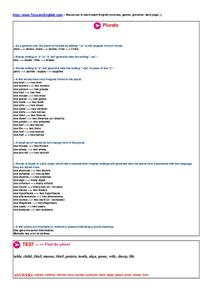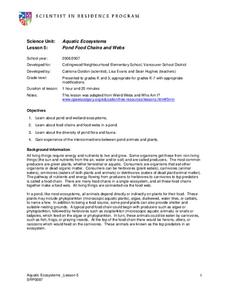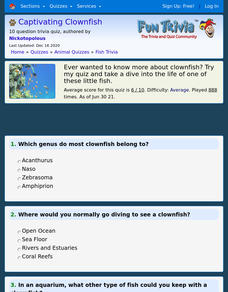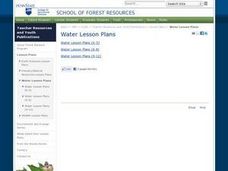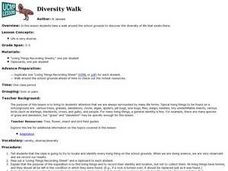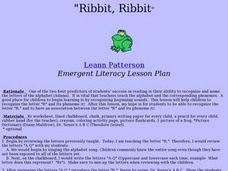Curated OER
Let's Get to the Bottom of the Arctic!
Students identify the three realms of the Arctic Ocean, and describe the relationships between these realms. They describe different species associations in a benthic community.
Curated OER
Leaf Transpiration
Young scholars determine the amount of water loss due the transpiration.
Curated OER
Coral Bleaching in the Caribbean
Students use authentic satellite data on the NASA website to determine when the sea surface temperature meets the criteria to induce coral bleaching.
Curated OER
Odyssey of Life, Part II-The Unknown World
Students complete an experiment in which they observe different natural sample in which they uncover the microbial world. They complete a two part worksheet that accompanies the lesson.
Curated OER
Generation of Action Potentials in Nitella Giant Algal Cells
Students observe cytoplasmic streaming in Nitella cells. They examine the conduction of a wave of depolarization across other membranes, such as the axons of neurons. Students predict the effects of sending a small electric current...
Curated OER
State Of The Bay
Young scholars investigate the environmental problems that surround the Chesapeake Bay area. They use an environmental handout as a resource that should be supplemented with research. Also students ask specific questions to report...
Curated OER
Plant Life
Seventh graders examine different categories of plant life and their roles as producers of food and oxygen for other organisms. They study the evolution of plants from simple organisms to very complex ones. They look at the different...
Curated OER
Brine Shrimp Feeding
Third graders study the diet of the brine shrimp. This is an introduction to a math measurement of a micrometer because of the size of the food brine shrimp feed upon. They make predictions about the types of food shrimp eat based on...
Curated OER
Who Eats Whom in a Bermudian Coral Reef?
Pupils will be able to find out about feeding relationships on a coral reef. They then will be able to develop a food chain and food web using coral reef animals and plants using the Coral Website.
Curated OER
Snow on Sea Ice
High schoolers examine different samples of ice and predict the amount of snow that has fallen in a given year. Using a calculator, they graph the various thicknesses. They analyze the graphs to determine the relationship between the...
Curated OER
Water Quality Monitoring
Students comprehend the four parameters of water quality. They perform tests for salinity, dissolved oxygen, pH and clarity or turbidity. Students comprehend why scientists and environmental managers monitor water uality and aquatic...
Curated OER
Plurals
For this plurals worksheet, 7th graders review and discuss how to change regular nouns into plural nouns and change twelve ordinary nouns into plural nouns.
Curated OER
Antarctica Vocabulary Quiz
In this Antarctica vocabulary worksheet, students match vocabulary words about Antarctica with definitions, 15 words total. Worksheet contains a link to additional activities. Labeled as a quiz, but may be used for practice or review.
Curated OER
From Polliwog to Frog
Students examine how frogs change. In this life cycle lesson, students create a model to show how a frog changes throughout its life. Students will show the process of frog metamorphosis, from polliwog to adult frog.
Curated OER
The Dead Zone: A Marine Horror Story
Students graph dissolved oxygen versus depth using data taken from NECOP Program. For this marine science lesson, students explain the causes of hypoxia. They recommend possible solutions to this problem.
Curated OER
Water Quality
Students play the role of scientists testing for water quality in the area. In this ecology lesson, students determine the water sample's pH, temperature, dissolved oxygen and turbidity. They write a journal reflection after the activity.
Curated OER
Effects of organic material and nutrient pollution
Students create a definition of eutrophication. In this organic material lesson students work together to create a storyline.
Curated OER
Aquatic Ecosystems
Students study ponds and wetland ecosystems and examine the food chains and webs in them. For this aquatic ecosystems lesson students answer questions about the diversity of the flora and fauna in a pond.
Curated OER
Captivating Clownfish Quiz
In this online quiz worksheet, students answer a set of multiple choice questions about clownfish. Page includes links to answers and resources.
Curated OER
"Pennsylvania Watersheds, Many Ways to the Sea"
Students trace a molecule of water through the water cycle including each of its three loops. They describe why evapotranspiration demands the largest portion of total precipitation falling on a forested watershed.
Curated OER
Diversity Walk
Students take a walk around the school grounds to discover the diversity of life that exists there.
Curated OER
Ribbit! Ribbit!
Students research a frog's life cycle and habitat using books, the Internet and lecture. Students make origami frogs, write letters to Toad from Arnold Lobel's "Frog and Toad" and participate in a simulated camouflage activity.
Curated OER
C.S.I. on the Deep Reef
Students study chemotropic sybioses and chemotropic nutrition. In groups, they complete a Chemotrophic Species Investigations (CSI) Worksheet.
Curated OER
A Tale of Two Reactors
Tenth graders role-play as members of the food chain. Sticky tables acting as polluting factors are introduced and members of different trophic levels suffer varying degrees of damage due to those pollutants.
Other popular searches
- Algae. Phytoplankton
- Algae Growth
- Coralline Algae
- Algae Cells
- Marine Algae
- Red Algae
- Corals and Algae
- Algae Blooms
- Multicellular Algae
- Blue Green Algae
- Phosphate Algae Detergents
- Green Algae


